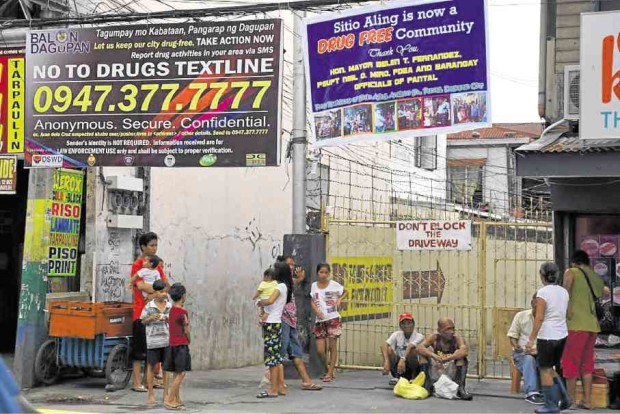
CRIME ALLEY NO MORE Residents of Sitio Aling in Dagupan City’s Pantal village join hands to ensure that their community is free of crime. —WILLIE LOMIBAO
DAGUPAN CITY—For more than a month now, residents have been taking turns standing guard at the main entrance of an alley called Aling to prevent strangers from entering Barangay Pantal here.
Closing their doors to people they do not know was a drastic step they took to remove the stigma that had haunted their place for several years now.
Aling, which lies at the back of commercial buildings lining Arellano Street in the downtown area, has been known as a haven for illegal drug dealers and thieves.
People access a 1-meter concrete pathway to reach a maze of shanties there.
Police operations that led to the arrest of several people in the area were conducted in the past. A fire in 2007 also struck the community but residents rebuilt from the ashes.
“We are doing OK now. There are no more drugs, no more bystanders because they are all working now,” said John Sison, a resident.
The turning point came when police conducted raids in August that led to the arrest of 15 suspected drug dealers.
On Aug. 15 and 21, two drug dealers were shot dead by unidentified men. Terrified, residents trooped to the police to meet with Supt. Neil Miro, Dagupan police chief.
“We talked and they said they wanted to have a peaceful community. So they designated their leaders and we briefed them on how they could help law enforcers in the campaign against drugs,” said Miro.
Quick changes
He said more than 1,000 Aling residents agreed to display identification badges.
The change was so quick that on Aug. 22, a tarpaulin declaring Aling as a “drug-free community” was put up at the village’s main entrance. “We now want our place to be what it is today. People are now cooperating,” said Sison.
Robert Tapang, who has lived in the place since 1967, said he has been sleeping well, finally.
Drunk men used to fight almost every night in the past. There was also an endless stream of strangers day and night, going in and out of the drug dens in the place.
“Why did they have to wait for some people to die before changing their ways?” Tapang asked.
Social science professor Adele Traspe, director of University of Pangasinan’s Center for Student Development and Leadership, said it may have been the community’s best decision when residents shut their doors to strangers.
Residents have reached a point when they have to protect not just the reputation of people or their families, but the image of their community, Traspe said.
“The challenge now is for how long will they be able to do that? What are critical here are the leaders and the monitoring being conducted by their local partners,” he said.
He said the stigma that had been associated with Aling could only be completely removed if people outside the community also changed their perception about the place.
For instance, he said, a student who lost his or her telephone to a snatcher should not immediately jump to the conclusion that the thief was from Aling.
But changing the community’s reputation will take time, he said.
“I hope that those who have good experiences in Aling will share them to change the perception about the place. And those who have negative experiences will go back to the place to see for themselves that it’s no longer the place they used to know,” he said.